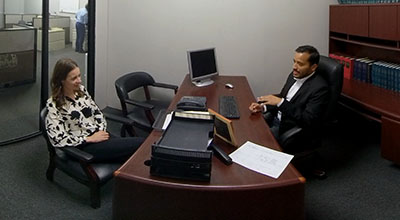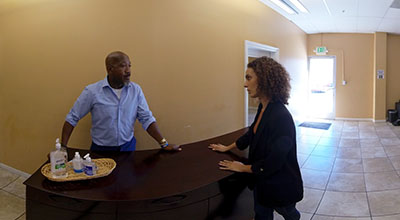Empathy in the Workplace
Practical tools to strengthen your relationships with others in the workplace and in your personal life.
Enroll NowCourse overview
Online
CPD Accredited
16 online lessons
Digital certificate
5 practice exercises
2 hours of learning
Course outcomes
Learn how to be more empathic to colleagues
Understand the purpose of core empathy
Better relate to others empathically
Practice the art of empathy
Recognize when certain empathic responses are appropriate
Contribute to a flourishing and empathic workplace
According to a 2018 study, 96% of employees consider it important for employers to demonstrate empathy, and yet 92% believe this trait is undervalued in their workplaces.
How can this be true? If everyone thinks that empathy is important, why is it so very absent in the workplace?
There are many reasons for empathy's absence. For instance, we are often distracted by our immediate tasks, we experience on the job stress, and are often under a lot of pressure to perform well consistently, and these and other factors contribute to our inability to show empathy, even though we consider it beneficial to ourselves and to our co-workers.
But the good news is that we can learn how to develop and practice empathy daily despite the many obstacles that often keep us acting empathically, and our ability to relate to others empathically really makes a difference in the workplace. People leave their non-empathic workplace environments, not their jobs. What type of environment do you wish to help create?

What to expect
One of the very first things you will learn in this course is that empathy is a multidimensional experience involving our ability to observe and be mindful of those situations that encourage us to be empathic; it is also a technique of creating unity and connection between yourself and others, as well as a basic sentiment in which you truly care for the well-being of others.
Practice exercises
Throughout the course, you will have the chance to experience immersive situations of different, though common, experiences in the workplace that are dealt with most successfully by practicing the art of empathy.
During these experiences, you will have to chance to apply what you learned in this course to your experience of each given situation.
The goal of this third section is to help you think about the different habits, skills, and techniques that, once developed, are helpful for not only recognizing when empathic responses are appropriate but also for responding to situations in the workplace in the most compassionate and rational manner possible.
Online learning, done differently
This course combines online learning with practice exercises for a unique learning approach. At certain points throughout this Empathy in the Workplace course, you'll be prompted to experience what you've learned.

Online classes
Learn through a series of videos, quizzes, and case studies online - available to access at any time.
Practice exercises
Practice what you learn with interactive exercises. Better understand workplace situations by seeing how you react.

Improve with feedback
Receive feedback on your performance to help identify empathic areas you need to learn more about.
Course content
- People mean many different things when they speak of empathy. In this lesson, we explore the multiple and often conflicting ideas when we think about our ability to empathize with others for the purpose of establishing a pluralistic and all-encompassing understanding of this powerful skill we call empathy.
- Welcome and what to expect
- What is empathy?
- Empathy: A pluralistic perspective
- Why empathy is important in the workplace
- Core empathy
- We explore what people mean by "empathy" throughout history and establish a useful way of thinking about and practicing empathy (what we are calling core empathy). Understanding core empathy is an important and necessary step before we can discuss ways to develop and practice empathy in our daily lives.
- Empathic projection
- Empathic connection
- Empathic care
- We examine the practical value of numerous techniques for developing and practicing core empathy. Specifically, we explore the skills of self-awareness, mindfulness, observation, active listening, showing compassion, conversing well with others, belonging and bonding, and the art of appreciation.
- Becoming self-aware
- From bonding to belonging
- Nurturing mindfulness
- Creating crucial conversations
- Developing observation skills
- The art of appreciation
- Active listening
- Cultivating compassion
- In this section, you'll practice a range of empathic situations to help you strengthen your relationships with others in the workplace.
Your instructor

Dr. Mark Fagiano

Dr. Mark Fagiano is an internationally recognized author and scholar in the subjects of philosophy and ethics. His 2019 essay describing his unified theory of empathy was awarded the Papazian prize and was published in the International Journal for Philosophical Studies.
His book on empathy with Bloomsbury Press called "Practicing Empathy: Pragmatism and the Value of Relations" has received excellent reviews by recognized scholars, calling it "a first-rate study" and a "tour de force."
The content of this Empathy in the Workplace course is drawn from his book and has been designed based on Mark's research into neuroscience, psychology, and the history of ethics.
Fagiano is currently teaching at Washington State University, where he is creating a virtual reality lab for ethics, which will give students the opportunity to have visceral and embodied experiences of common moral dilemmas.
Practice exercises
At certain points in the course, you'll experience immersive situations of different, though common, situations in the workplace that are dealt with most successfully by practicing the art of empathy.

Self-knowledge

Recognizing emotions

Dealing with an angry customer

Correction during a meeting

Reading non-verbal communication
Explore all the exercises available on the VirtualSpeech platform.
See all exercises370,000+
Online learners
4x
Faster than classroom training
6
Learning awards
What's included in this course
- 2 hours of learning
- 2 case studies
- 5 practice exercises
- All exercise features
- Quizzes and assessment
- Earn a digital course certificate
- Flexible, self-led format
- Access to updated content



